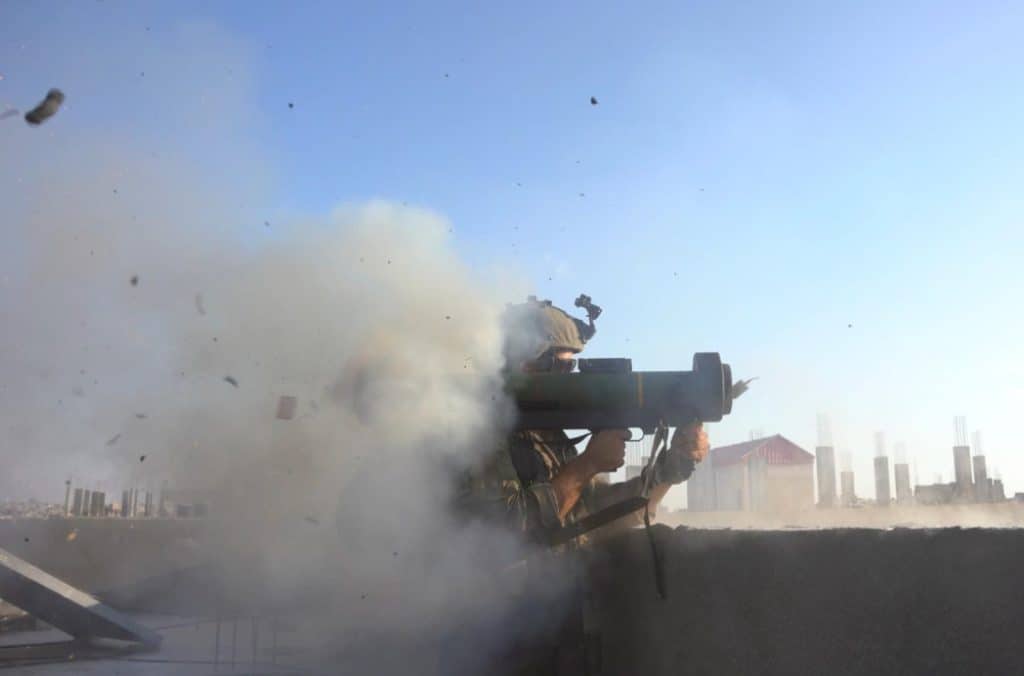
The Israel Defense Forces’ (IDF) 162nd Division, which has been operating in Rafah since May, eliminated 200 terrorists in a week of fighting, the IDF said on September 4. The division is the main unit securing the southern Gaza border area near Egypt.
The IDF entered Rafah in May after Palestinian terrorists launched projectiles at IDF troops in Kerem Shalom. The advance followed several months in which Israeli political leaders, including Prime Minister Benjamin Netanyahu, had vowed to enter Rafah and take control of Gaza’s border with Egypt. This area, known as the Philadelphi Corridor, is around 8.7 miles long and has long been used by Hamas to control smuggling routes and goods entering Gaza.
On September 4, Netanyahu stated that the Philadelphi Corridor became completely porous after Israel left Gaza in 2005. “This border, once we left our side of the Philadelphi Corridor, rockets went in, missiles went in, drones went in, ammo went in, weapons manufacturing equipment came in, tunnel drilling equipment came in,” he said. Netanyahu also said he is resolved to have Israel keep control of the key route. Hamas has demanded that the IDF withdraw from the area as part of any hostage and ceasefire deal.
Hamas had a brigade of fighters in Rafah and along the border prior to the IDF’s operation in May. The IDF defeated this “Rafah Brigade” in early August after about three months of fighting. However, the IDF’s recent description of operations by the 162nd Division illustrates that the terrorists continue to have a presence in Rafah.
The 162nd has been operating in an area called Tel al-Sultan, which is next to Rafah. “Over the past week, the troops of the 401st Brigade have been conducting precise, intelligence-based operations in the Tel al-Sultan area, as part of the 162nd Division’s operations in Rafah. To date, the troops have eliminated over 200 terrorists and located dozens of weapons in civilian structures during the operations,” the IDF said on September 4.
Israeli soldiers have faced sniper attacks and additional threats and found rocket launchers and large quantities of weapons in buildings. The number of rockets fired by various groups in Gaza has vastly declined from the opening days of the war. Nevertheless, 116 rockets were fired from Gaza at Israel in August, according to Israel’s official data.
The 162nd division has been fighting for four months near the Philadelphi Corridor. This effort has cleared an area along the border to make the sector more secure and enable using unarmored vehicles such as Humvees. These operations are similar to those Israel conducted the Netzarim Corridor south of Gaza City. The IDF now essentially controls both corridors and uses them to operate in nearby areas. In general, most of the rest of Gaza is not controlled by the IDF, and Hamas uses other areas to stage attacks and prepare improvised explosive devices.
In Netanyahu’s September 4 speech about the Philadelphi Corridor, he spelled out how Iran’s backing of Hamas turned Gaza into a “terrorist enclave” that threatened most of Israel with long-range rocket fire.
“You have to understand that the centrality, the centrality of the Philadelphi Corridor to the arming of Gaza, to the arming of Hamas and this all led to the October 7th massacre, which Hamas has vowed, proudly vowed to do again and again and again,” Netanyahu said, according to a transcript of his speech released by Israel’s Government Press Office.
Netanyahu states Israel is now pursuing three goals in Gaza: “The first war goal was to destroy Hamas’s military and governing capabilities. The second was to free our hostages. And the third was to ensure that Gaza never again poses a threat to Israel.” He asserts that leaving the Philadelphi Corridor will not return the hostages. Instead, Netanyahu argues that military pressure on Hamas and Israel’s resolve to stay in southern Gaza will result in a hostage deal.







